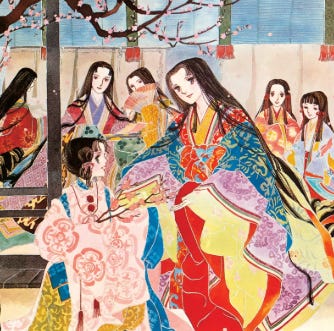源氏物語の主人公、光源氏(ひかるげんじ)は、たくさんの女性を愛しました。その始まりが「藤壺の宮(ふじつぼのみや)」です。
「あさきゆめみし」大和和紀より
藤壺の宮は、光源氏の父である桐壺帝(きりつぼのみかど)の后の一人です。つまり、光源氏にとって藤壺の宮は義理の母にあたります。さらに、藤壺の宮は光源氏の亡くなった母である桐壺更衣(きりつぼのこうい)にとてもよく似ていました。そのため、光源氏は子どものころから藤壺の宮に母親の面影を重ねて、特別な気持ちを持つようになります。
大人になった光源氏は、藤壺の宮に気持ちを伝えますが、彼女はそれを拒みます。しかし、光源氏は無理やり関係を持ってしまい、その結果、子どもが生まれます。この子どもは冷泉帝(れいぜいてい)と呼ばれ、将来の天皇になります。冷泉帝は表向きには桐壺帝の子どもとされていますが、実際には光源氏の子どもです。この秘密が物語の中で大きなテーマになります。藤壺の宮と光源氏は、桐壺帝と世間に嘘をつきとおすことを決めますが、そのことがふたりの心、特に藤壺の宮に深い苦しみをもたらします。
藤壺の宮は気品が高く、上品で慎重な女性として描かれています。彼女は夫や世間への秘密に苦しみました。また、義理の母親としての立場と、光源氏への気持ちの間で罪悪感を抱え続けます。皮肉なことに、光源氏に隙を見せない藤壺の宮の態度が、逆に光源氏をさらに惹きつけてしまうのです。
「あさきゆめみし」大和和紀より
最終的に、藤壺の宮は出家をして、俗世から離れることを選びます。出家は、単なる宗教的な行為ではなく、平安時代の人々にとって人生を変える重要な決断でした。特に女性にとって、心の平安を得るための一つの方法だったのです。『源氏物語』では、出家は心の苦しみを浄化し、運命を受け入れる行動として描かれています。
藤壺の宮は、源氏物語の中で大きな存在感を持つ女性であり、彼女の生き方には多くのドラマがありました。「光り輝くほど」と言われていた彼女の美しさや気品、そして教養も高く優雅さを持つ彼女は、『源氏物語』の中で光源氏が最も理想とした女性です。藤壺の宮の存在は、光源氏にとって「手に入らない理想」だったのかもしれません。
しかし、彼女は完璧すぎるゆえに、自分の本当の気持ちや自由な選択をすることができず、苦しみを抱え続けたように感じます。彼女の人生は「周囲の期待と義務に縛られた不自由なもの」だったように思えます。そういった観点から、決して幸せな人生ではなかったかもしれませんが、それでも、自分の責任を全うし続けた彼女の強さは素晴らしいと思います。
単語帳-Vocabulary
主人公(しゅじんこう) – Main character
女性(じょせい) – Woman
気持ち(きもち) – Feeling
天皇(てんのう) – Emperor
秘密(ひみつ) – Secret
心(こころ) – Heart, mind
人生(じんせい) – Life
后(きさき) – Empress, consort
面影(おもかげ) – Reminiscence, likeness
気品(きひん) – Elegance
罪悪感(ざいあくかん) – Guilt
出家(しゅっけ) – Becoming a monk/nun
俗世(ぞくせ) – Secular world
運命(うんめい) – Fate, destiny
優雅(ゆうが)-Grace, elegance
理想(りそう)-Ideal
存在(そんざい)-Existence
完璧(かんぺき)-Perfect
選択(せんたく)-Choice
義務(ぎむ)-Duty
不自由(ふじゆう)-Lack of freedom
周囲(しゅうい)-Surroundings
期待(きたい)-Expectation
責任(せきにん)-Responsibility
全うする(まっとうする)-To carry out
Translation
The protagonist of The Tale of Genji, Hikaru Genji, loved many women. The first of them was Fujitsubo no Miya. Fujitsubo no Miya was one of the consorts of Kiritsubo Emperor, who was Genji’s father. In other words, Fujitsubo no Miya was Genji’s stepmother. Furthermore, Fujitsubo no Miya closely resembled Genji’s late mother, Kiritsubo no Kōi. For this reason, from his childhood, Genji projected the image of his mother onto Fujitsubo no Miya and developed special feelings for her.
As an adult, Genji confessed his feelings to Fujitsubo no Miya, but she rejected him. However, Genji forcibly initiated a relationship with her, resulting in the birth of a child. This child was called Emperor Reizei and became a future emperor. Officially, Emperor Reizei was considered the child of Kiritsubo Emperor, but in reality, he was Genji’s child. This secret became a major theme in the story. Fujitsubo no Miya and Genji decided to keep this truth hidden from Kiritsubo Emperor and society, but this decision caused deep suffering for both of them, especially Fujitsubo no Miya.
Fujitsubo no Miya is depicted as a woman of high dignity, elegance, and caution. She suffered from the secret she kept from her husband and society. Additionally, she constantly carried a sense of guilt between her position as a stepmother and her feelings for Genji. Ironically, Fujitsubo no Miya’s reserved and unyielding attitude only made Genji even more attracted to her.
In the end, Fujitsubo no Miya chose to leave the secular world by becoming a nun. In the Heian period, this was not merely a religious act but an important life decision. Especially for women, it was one way to find peace of mind. In The Tale of Genji, taking vows is portrayed as an action that purifies the soul and accepts one’s fate.
Fujitsubo no Miya was a woman with a significant presence in The Tale of Genji, and her life was filled with drama. Her beauty, described as “radiant,” along with her dignity, high education, and elegance, made her the woman Genji idealized the most. Fujitsubo no Miya’s existence may have represented an “unattainable ideal” for Genji.
However, because she was too perfect, she seemed unable to express her true feelings or make free choices, and she continued to suffer. Her life appeared to be one “bound by the expectations and obligations of those around her.” From this perspective, her life may not have been a happy one, but even so, her strength in fulfilling her responsibilities was remarkable.





